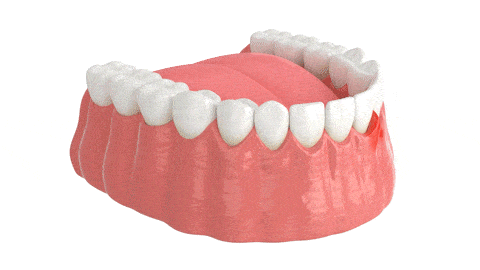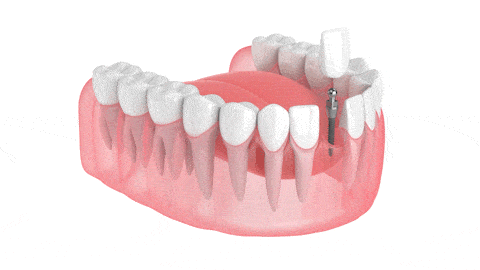Gum Disease Treatment in Austin, TX
Are your gums red or swollen? Do they bleed when you brush your teeth? Have you noticed your gums receding or a tooth that has become loose? If so, you may have gum disease. While common, this oral health problem requires intervention. Gum disease treatment is most effective when started early, so if you or someone you love may have gum disease, it’s best to visit Aspire Dental for an evaluation.
With a reputation for skilled, compassionate care, you can trust that Dr. Hall, Dr. McNeil, and their experienced team are dedicated to restoring your oral health.
Understanding Gum Disease
Gum disease, or periodontal disease, is a chronic infection in your gums. It is primarily caused by poor oral hygiene. When the bacteria, saliva, and food particles in your teeth are not removed through proper brushing and flossing, plaque forms on the teeth. If left on the teeth, this sticky film hardens and becomes tartar (also known as calculus) that cannot be removed from your toothbrush alone.
Unfortunately, tartar harbors bacteria that can migrate below the gumline, causing inflammation and infection of the gums. To restore your oral health, you’ll need to visit us so that we can manage and control the infection.
The Stages of Periodontal Disease
Periodontal disease is considered a “silent disease” because you may not experience concerning symptoms immediately. While some people have painful, tender, swollen, red, or bleeding gums at the onset of the disease, others don’t experience symptoms until the infection has advanced significantly.
Understanding the progression of gum disease can help you recognize early signs and treat the problem before it worsens. The condition evolves through multiple stages, each exhibiting indicators worth monitoring.
Gingivitis
This early stage of gum disease can develop as early as childhood, as it is most frequently caused by poor oral hygiene habits. Individuals with gingivitis may have no symptoms or mild ones. Symptoms include red, swollen, or tender gums that may bleed when you brush or floss your teeth. Other common signs are persistent bad breath and sensitivity to hot and cold foods or drinks. At this stage, the condition is reversible with a diligent oral hygiene routine and professional dental cleanings.
Periodontitis
This stage is most common in adulthood when gingivitis has gone unnoticed or untreated. During this stage, symptoms become more pronounced as plaque migrates below the gum line. Gum recession is more noticeable as the gums separate from the tooth, creating a pocket. You may also notice pus at the edge of the gums. Additionally, moderate periodontitis may involve tooth mobility or shifting as the surrounding tissues and bone begin to weaken and deteriorate.
Advanced Periodontitis
Significant tissue and bone loss occurs at this stage. As a result, the teeth continue to loosen and may fall out. Tooth extraction may be needed to prevent further damage that compromises your long-term oral health.
Gum disease is more prevalent with age, and periodontitis remains the main cause of tooth loss among seniors. Approximately 65 million adults aged 30 and older have periodontitis—that’s 46% of the U.S. adult population. While common, gum disease is preventable, and early stages can be managed and controlled. Recognizing the early signs of gum disease is crucial in preventing its progression to later stages.
The Dangers of Delaying Gum Disease Treatment
Though daily routines and responsibilities sometimes become a barrier to prompt dental care, delaying periodontal maintenance can have serious consequences.
Ignoring gum disease results in discomfort, infection, painful abscesses, gum recession, and bone loss. As the bone continues to deteriorate, the teeth loosen and eventually fall out. The condition can also have adverse effects on your overall health. Gum disease is correlated with a higher risk of serious conditions, such as heart disease, diabetes, stroke, and more.
Additionally, while we can replace missing teeth swiftly with dental implants, substantial bone loss can affect your eligibility for this transformative procedure. At Aspire Dental, we specialize in mini dental implants—smaller versions of conventional implants—which allow us to replace teeth in weakened jawbones. However, even mini implants require sufficient bone density and volume. The longer you delay gum disease treatment, the more vulnerable your jawbone becomes.
Gum Disease Treatment Options
Patients often ask us how gum disease is treated. While gum disease is treatable, the method we use will depend on how advanced the condition is. Prompt treatment is crucial, as our goal is to stop the disease from progressing. We’ll begin with a non-surgical approach and utilize surgical options only when needed.
Non-Surgical Gum Disease Treatment
To remove a significant accumulation of plaque and tartar, we complete what is called a debridement—a meticulous cleaning procedure that extends beyond the scope of routine cleaning. This initial gum disease treatment involves eliminating tartar and bacterial film that accumulate below the gum line, along with the substances created by this buildup.
At your appointment, we’ll use a local anesthetic to numb the treatment area. Then, using a special instrument, we’ll remove the tartar and plaque while safeguarding as much of the tooth’s surface as possible. This usually takes about an hour. With debridement, our goal is to restore your gum health by reducing bacteria and alleviating inflammation. After your procedure, you will come in on a frequent basis so that we can keep the disease under control and get your mouth back to a state of health.
If needed, we can use additional non-surgical interventions. Techniques like scaling and root planing are slightly more invasive cleaning procedures. Scaling involves removing tartar deeper beneath the gums, while root planing smooths the tooth’s roots in areas where pockets between the tooth and gums have formed. This allows the gums to reattach to the teeth.
We may also prescribe topical or oral antibiotics to help resolve the infection.
Surgical Gum Disease Treatment
In cases of more advanced gum disease, we may need to perform surgical interventions. For some patients, gum flap surgery may be needed to decrease and clean periodontal pockets. To do this, we will make a linear incision or flap to access the pocket. We’ll then remove the infected tissue and thoroughly clean the roots before closing the flap. This treats the gum disease to restore your oral health.
We can also address bone and tissue loss with grafting treatments. Bone grafting is a procedure that builds up the jawbone. Not only does bone grafting maintain the health of nearby teeth, but it also allows for dental implants if teeth need to be replaced. We can also perform a tissue graft to replace lost gum tissue.
Tooth Replacement
 When gum disease results in tooth loss, we can replace the tooth using innovative mini dental implants. These small screws are implanted in the jaw to create a stable foundation for an artificial crown, bridge, or denture. Because of the narrow diameter and simplified design of mini implants, we can place these devices more easily than traditional options. The procedure drastically reduces the long treatment timeline associated with conventional implants and offers immediate results. With this minimally invasive procedure, you can also expect a much quicker recovery.
When gum disease results in tooth loss, we can replace the tooth using innovative mini dental implants. These small screws are implanted in the jaw to create a stable foundation for an artificial crown, bridge, or denture. Because of the narrow diameter and simplified design of mini implants, we can place these devices more easily than traditional options. The procedure drastically reduces the long treatment timeline associated with conventional implants and offers immediate results. With this minimally invasive procedure, you can also expect a much quicker recovery.
This cost-effective tooth loss solution boasts impressive, natural, and long-lasting results while preserving your jawbone’s health. If you are suffering from tooth loss due to gum disease or other factors, give us a call so we can evaluate your situation.
Preventing Periodontal Disease
While there are several treatment options for gum disease, prevention is always the goal. A diligent oral hygiene routine will prevent gum disease from developing and is crucial for those who have undergone treatment. To properly care for your teeth and gums, be sure to follow these recommendations:
- Brush your teeth twice daily with a soft-bristle brush and fluoride toothpaste. Holding your toothbrush at a 45-degree angle will help clean the gum line.
- Floss daily with traditional dental floss, a water flosser, or a floss pick.
- Limit foods and drinks with a high sugar content.
- Rinse with a therapeutic mouthwash that targets gum disease.
- Avoid tobacco products.
Following these guidelines and maintaining routine visits to Aspire Dental will help keep your oral cavity free from disease, decay, and other problems.
Gum Disease Treatment Restores Your Oral Health
While the goal is always to prevent gum disease from developing in the first place, if you or someone you love may be suffering from gingivitis or periodontitis, contact the team at Aspire Dental. Our compassionate dental professionals will evaluate your teeth, gums, and jaw to determine the severity of the disease and plan an appropriate treatment course. With various treatment options, we’ll help you regain your oral health.
